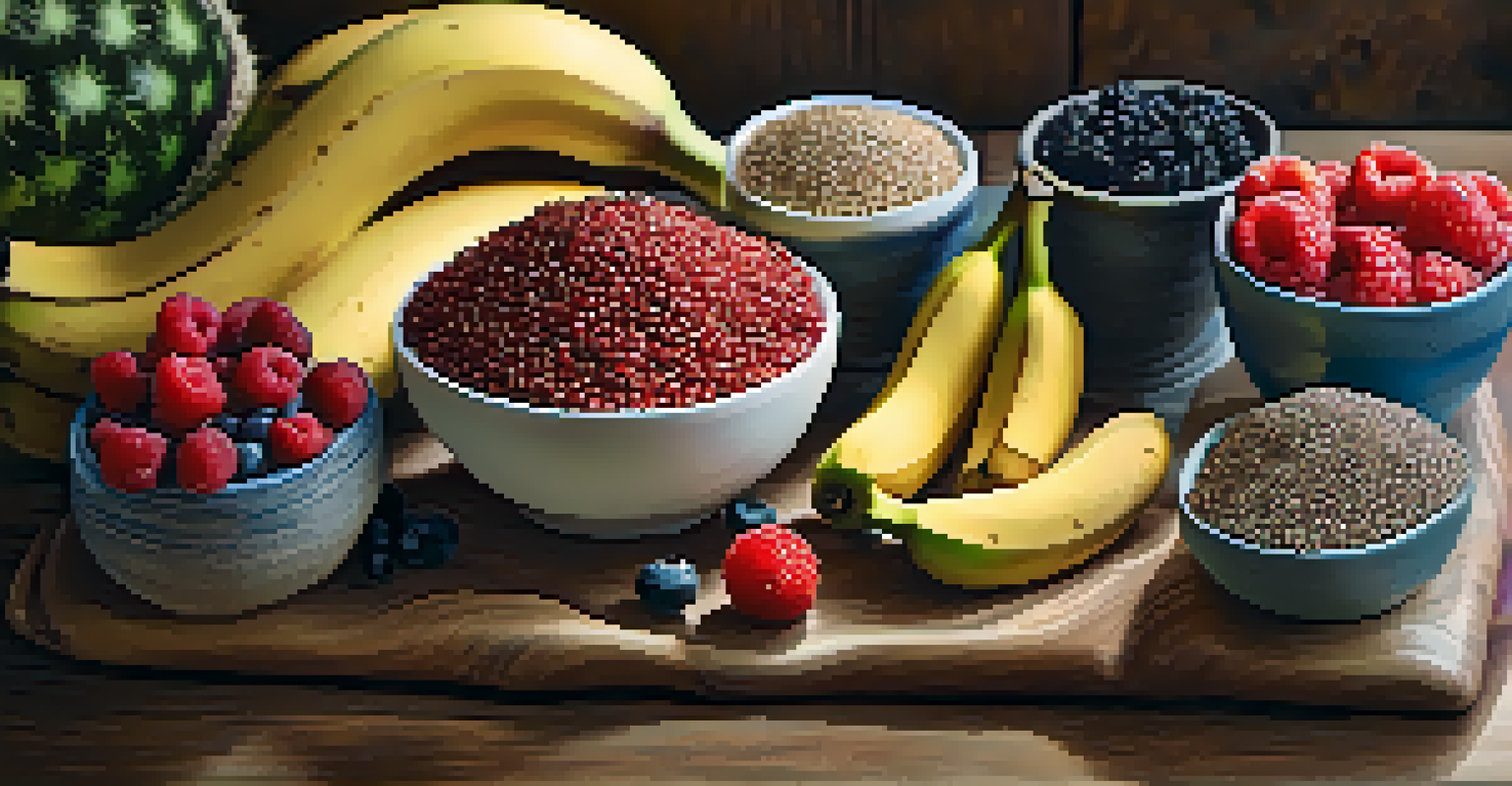Exploring the Health Food Movement: Origins and Evolution

Understanding the Roots of the Health Food Movement
The health food movement has deep roots that trace back to ancient civilizations. Early societies recognized the importance of natural foods for well-being, often relying on local plants and herbs. This foundational understanding laid the groundwork for what we now consider health food.
Let food be thy medicine and medicine be thy food.
Fast forward to the 19th century, when the Industrial Revolution began to change our relationship with food. With the rise of processed foods, health enthusiasts started advocating for a return to whole, unrefined ingredients. This period sparked a growing awareness of how food impacts our health.
The establishment of health food stores and vegetarianism in the late 1800s further propelled the movement. Pioneers like Sylvester Graham and John Harvey Kellogg emphasized the benefits of a plant-based diet. Their ideas became catalysts for the health food revolution we see today.
Key Figures Who Shaped the Movement
Throughout history, several influential figures have played pivotal roles in shaping the health food movement. Notable personalities include Dr. Benjamin Rush, who emphasized the connection between diet and health in the 18th century. His insights set the stage for future advocates who would champion natural eating.

In the early 20th century, pioneers like Adelle Davis promoted the idea that nutrition could prevent diseases. Her bestselling books inspired countless individuals to rethink their diets. These early health advocates laid the foundation for a more conscious approach to eating.
Health Food Movement's Rich History
The health food movement has evolved from ancient civilizations to modern dietary practices, emphasizing natural foods and plant-based diets.
More recently, figures like Michael Pollan and Marion Nestle have continued to influence the movement. Their emphasis on whole foods and sustainable practices resonates with modern consumers. These voices remind us to prioritize not just what we eat, but how our food choices impact the world.
The Rise of Organic Foods in the 20th Century
The 1960s and 70s marked a significant turning point for organic foods. As people became more aware of chemical additives in their diets, the demand for organic options surged. This period saw the establishment of organic farming practices that eschewed synthetic pesticides and fertilizers.
You are what you eat.
Farmers' markets emerged as popular venues for consumers seeking fresh, organic produce. This grassroots movement enabled communities to connect directly with local growers. The accessibility of organic foods began to reshape shopping habits and dietary choices.
As the organic movement gained momentum, certification programs were established to ensure quality and authenticity. By the late 1990s, organic products made their way into mainstream grocery stores, marking a victory for health-conscious consumers. This shift highlighted a broader societal embrace of cleaner, more sustainable eating habits.
Health Food Trends of the 21st Century
Entering the 21st century, the health food movement has continued to evolve with new trends and innovations. Superfoods, like quinoa and chia seeds, have taken center stage, touted for their nutritional benefits. These ingredients have found their way into everything from smoothies to snack bars.
Plant-based diets have also gained popularity, with more people choosing vegetarian or vegan lifestyles. This shift is not only about health but also reflects growing environmental awareness. Consumers are increasingly making food choices that align with their values.
Sustainability Shapes Food Choices
Sustainability is now a central theme in the health food movement, influencing consumer preferences and encouraging eco-friendly practices.
Additionally, the rise of technology has transformed how we access health information. Social media platforms and health apps allow individuals to share tips and recipes, creating a vibrant online community. This digital age has made the health food movement more accessible than ever.
The Role of Sustainability in Modern Health Food
Sustainability has become a key focus within the health food movement, intertwining environmental consciousness with dietary choices. Consumers are now more aware of the ecological impact of their food, prompting a shift towards sustainable farming practices. This awareness influences everything from ingredient sourcing to packaging.
Many brands are adopting transparent practices, highlighting their commitment to sustainability. For instance, companies that focus on regenerative agriculture aim to restore soil health while providing nutritious food. This approach resonates with consumers who seek to make responsible choices.
As a result, sustainable health food products are increasingly available on supermarket shelves. From organic snacks to ethically sourced proteins, these options cater to the growing demand for eco-friendly alternatives. The marriage of health and sustainability is shaping the future of the food landscape.
Challenges Facing the Health Food Movement
Despite its growth, the health food movement faces several challenges that could hinder its progress. One major issue is the prevalence of misinformation about nutrition and health. With so many diets and trends emerging, consumers can easily become confused about what constitutes healthy eating.
Additionally, access to health foods remains a significant barrier for many communities. Food deserts, areas with limited access to fresh produce, disproportionately affect low-income populations. This inequality raises questions about the inclusivity of the health food movement and its ability to reach everyone.
Challenges Impacting Health Food Growth
The health food movement faces obstacles such as misinformation, accessibility issues, and health-washing that could impede its progress.
Finally, the commercialization of health food can lead to 'health-washing,' where products are marketed as healthy without substantial nutritional value. This trend complicates consumers' ability to make informed choices. Addressing these challenges is crucial for the continued growth and authenticity of the health food movement.
The Future of the Health Food Movement
Looking ahead, the health food movement is poised for further evolution as consumer preferences change. Innovations in food technology, such as lab-grown meats and alternative proteins, are likely to reshape diets. These advancements may offer sustainable options that appeal to health-conscious consumers.
Moreover, as awareness of mental health grows, holistic approaches to nutrition are becoming more prevalent. People are recognizing the connection between diet and mental well-being, leading to a greater demand for foods that support cognitive health. This shift could further diversify the types of health foods available.

Ultimately, the future of the health food movement will depend on its ability to adapt and innovate. By addressing challenges and embracing new trends, it can continue to promote health and wellness for generations to come. The journey of health food is far from over, and its evolution will keep us engaged.